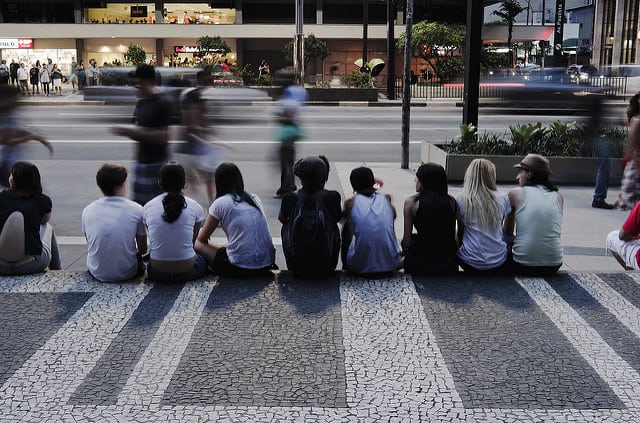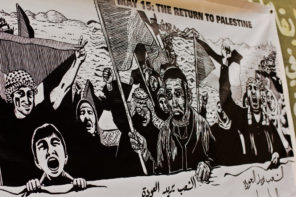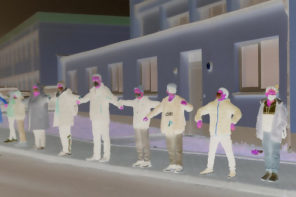On October 8, 2018, the day after the first round of the Brazilian presidential elections, I exchanged several worried whatsapp messages with friends and “key informants” in Brazil. Jair Bolsonaro, a right-wing extremist with clearly fascist political views who until recently had been a relatively unknown backbencher in Brazil’s Congress, had only just missed the 50 percent mark in the race for the presidency – and would clearly win the run-off three weeks later against Fernando Haddad from the Workers’ Party (PT).
In the weeks between the first and the second round of the presidential election, Brazil witnessed a number of violent crimes directed against left-wing supporters, journalists, black and queer persons and indigenous communities – i.e. members of those groups against which Bolsonaro had been stirring up hatred. Even though violence against these groups is not a new phenomenon in Brazil, many of their members perceived the attacks as a change in intensity and as a first taste of who would become a target under the new government. On January 1, 2019, Bolsonaro officially took office – and the initial political decisions of his government as well as the composition of the cabinet indicate that dark days are looming in Brazil.
As an anthropologist working on Brazil’s affirmative action policies, I research a topic that figured prominently in the electoral campaigns. The question of whether the different presidential candidates would aim to maintain the quotas for Afro-Brazilians (and, in some cases, indigenous or disabled persons) at universities and in the public service was a frequent touchstone in the evaluation of a candidate’s program. While most candidates defended the affirmative action policies – which had been introduced in federal universities from the beginning of the 2000s and in the public service as of 2014 – Bolsonaro declared that he would aim for a reduction of such quotas: “for God’s sake, let’s stop this division in Brazil” (cited in Antunes 2018; my translation). Furthermore, he questioned the existence of a historical debt towards the Afro-Brazilian population, for which the affirmative action policies are supposed to compensate in part.
With this rejection and his description of the affirmative action policies as divisive and unnecessary, Bolsonaro’s rhetoric indicates a return to the old narrative of Brazil as a ‘racial democracy’.
Under the military dictatorship (1964-1985), which Bolsonaro has regularly praised in the past, this ideology led to a coercive integration of all minorities into the ‘mestizo’ Brazilian nation. In the course of redemocratization, the Brazilian state turned away from this strategy of assimilation and started to adopt a politics of recognition which was more sensitive towards difference (cf. Costa 2007, 158) – with the affirmative action policies being one very concrete outcome.
Bolsonaro’s election victory therefore raises the question of what might happen under his government to these highly symbolic policies – policies which the Brazilian movimento negro (black movement) considers to be one of its main achievements of the past two decades (cf., e.g., Santos 2015). In what follows, I will reflect on this question and sketch out some possible scenarios. The concrete motivation for thinking about these issues is my own research, in which I investigate how race as a category of difference is established and made relevant through bureaucratic, administrative and legal action. Even though state institutions are not at the center of my research field (I focus on the so-called “verification commissions” that have to decide whether affirmative action candidates “rightfully” applied to vacancies), it makes a difference whether the processes I am studying take place in a country on the brink of fascism.
Affirmative action: the catalyst for a debate on racism in Brazil
In many accounts of the introduction of affirmative action policies in Brazil, the UN Conference against Racism that took place in Durban in 2001 figures prominently as a crucial “catalyst for a cascade of affirmative action policy announcements” (Htun 2004, 62). In the years following this conference, many public universities introduced quotas for black students and students of public schools, until such quotas became federal law in 2012. In 2014, another federal law introduced a quota of 20 per cent for black candidates in selection processes for the public service – the highly formalized and competitive concursos públicos that are in demand because they offer permanent and well-paid positions.

Photo by Gustavo Minas (flickr, CC BY-NC 2.0)
In contrast to the social quotas for students from poorer families, the implementation of racial quotas led to fierce public debates, projecting “the issue of race and racism to a level never before seen in modern Brazilian history” (Telles and Paixão 2013, 11). While proponents welcomed the affirmative action policies as helpful for redressing historical inequalities, opponents criticized the quotas as an inadmissible preferential treatment or argued that in such a ‘miscegenated’ country as Brazil, it would not be possible to ascertain who is black and who is not. After the Brazilian Supreme Court declared affirmative action constitutional, the debate calmed down. But the policies continue to be contested, and not a few of the interlocutors I met during my research still described the topic as a “minefield”.
The strong resistance and critique leveled against affirmative action policies can be seen in the context of historical continuities of racism – which also played a role in the great success of Bolsonaro, as the literary scholar Oliver Precht outlines in a recent essay (Precht 2018).
Classifying the welfare and social policies implemented under the progressive PT governments of Lula da Silva and Dilma Rousseff as social democratic approaches that avoided direct confrontation with the elites, Precht argues that the social structure of colonial times continues to exist, particularly in private employment relationships.
Against this background, Bolsonaro managed to foment a “longing for the good old days” (ibid.; my translation) with a clear distribution of roles between “the masters and the slaves” – to reference the title of a famous historical sociological account of Brazilian colonial society by Gilberto Freyre (1964).
The affirmative action measures were among the policies which challenged this traditional distribution of roles by enabling marginalized groups upward mobility and access to fields they had not been able to reach in the past. This might explain to some extent the resentment and hatred with which the white middle class reacts to the aspiring lower classes, Precht argues. The question of how the new government will handle the affirmative action policies therefore offers a good case through which to study its general approach towards racial inequality and racism.
Possible scenarios regarding affirmative action under Bolsonaro
So how could the new government actually abolish the quota laws if it wanted to put Bolsonaro’s campaign promises into practice? Both quota laws – implemented in 2012 for universities and in 2014 for the public service – will be valid for ten years. After their expiration, they need to be revised and evaluated and would have to be readopted by the Brazilian Congress in order to continue. Therefore, one possible scenario is that both laws will simply phase out in 2022 resp. 2024 – with the chances of reimplementation being extremely small under a Bolsonaro administration.
In order to abolish or change the existing quota laws before their expiry, the new government would have to present respective bills to the Congress. At present, the chances of success of such an attempt are difficult to evaluate. According to João Feres Júnior, a political scientist and expert on affirmative action, this will depend very much on how the political relation between the executive and the Congress will develop over the next years (cf. Melo 2018). In any case, possible alterations could still be repealed or contested in the Supreme Court.
Either way, such decisions would only affect federal institutions. The numerous existing quota laws at the state and municipal levels could continue to exist and their validity could even be extended. In addition, universities could decide to maintain affirmative action measures even after the abolition of the respective law. This would depend on, among other things, the mobilization and political will within these institutions. Furthermore, there will certainly be strong political movements advocating for the continuation of the federal quota laws in the years before 2022 and 2024. As mentioned above, the movimento negro claims the affirmative action policies as a major achievement and it is unlikely to give up on them without a struggle.
Therefore, the debate around affirmative action might resurface and might again serve as a crystallization point for discussions of racism and racial inequality in Brazil – problems that the Bolsonaro government will probably neglect as well as aggravate.
This governmental contempt has already become evident in recent debates about the future status of the Secretariat for Policies for the Promotion of Racial Equality (SEPPIR) – a central institution for the implementation of public policies in support of Afro-Brazilian and indigenous populations. In its first outline for the structure of the Ministry of Women, Family and Human Rights, the SEPPIR was assigned the status of a minor department. After an intervention by activists from the movimento negro, this was averted. However, the secretariat’s budget – which had already been cut significantly under the previous governments – suffered another drastic reduction, pointing to a further decrease of its political significance (Silva 2018).
Acute or permanent state of crisis?
To conclude, one can state that the affirmative action policies will probably not be a primary target of the Bolsonaro government. However, there are clear indicators that Brazil could return to the color-blind ideology which states that “we are all Brazilians and therefore do not need special rights for particular groups”. Therefore, the question of whether the affirmative action policies will be maintained or abolished will be a symbolically important arena regarding the (non-)recognition of the existence of racial inequality in Brazil. At the same time, one can argue that even before the change of government, this recognition was by no means firmly established in Brazilian society. The question therefore arises as to whether one can speak of an acute crisis – or whether those affected by racism in Brazil in fact live in a permanent state of crisis.
On the one hand, the situation for Afro-Brazilian activists and academics – who play a crucial role in the realm of the affirmative action policies – might well deteriorate under the new government, which has defined social movements as well as the education sector as two of its principal targets.
At the same time, I remember how one of my interview partners pointed out to me in 2017 that the black population in Brazil has always been living in a state of crisis, without anyone calling it so:
“For example, [if we look at] the mortality rates that have a more significant impact on the black population, the rates of mass incarceration that affect the black population. (…) This phenomenon already was occurring when no one was talking about a coup against democracy.[1] And it continues to occur in 2016, continues to occur in 2017 and will continue to occur in 2018. (…) Because these deaths, this incarceration are part of the normal functioning of democracy in Brazil. And these phenomena are not enough for us to declare crisis.” (Interview in October 2017)
According to this interview partner, the Brazilian political order indeed contains an “integrative perspective” (at least since the new constitution of 1988) of which the affirmative action policies are one result. However, this perspective coexists with a “politics of extermination” – leading to indicators on violence comparable to a country in a situation of war – which affects the black population in particular.
By referring to this argument, I do not aim to deny the qualitative changes and violent effects that the Bolsonaro government might bring about for Afro-Brazilians, indigenous people, women and LGBT persons (just to list those who probably will be the main target groups). However, I find it useful to keep in mind that this inequality has evolved historically – and that there has always been resistance against it. This makes it even more necessary to defend policies such as affirmative action, particularly since many activists emphasize that the policies did not come “out of nowhere” but instead have been built on decades of political articulation.
For critical social scientists working in this field, this means to recognize, on the one hand, that Bolsonaro’s election victory indeed “represents a serious political rupture” (Felinto et al. 2018). However, on the other hand, we also must not idealize the preceding, more liberal order. Rather, it is important to take into account the violent colonial structures on which this order was built, as well as how they remain relevant in these times. In doing so, we might be able to contribute to two central tasks of anthropologists as formulated by Rosa and Bonilla (2017, 6) following the election of Donald Trump, namely: “interrogating long-standing power formations and imagining new worlds”.
References
Antunes, Leda. 2018. Bolsonaro promete reduzir cotas para universidades e concursos. UOL, 24 August, https://noticias.uol.com.br/confere/ultimas-noticias/eder-content/2018/08/24/bolsonaro-promete-reduzir-cotas-para-universidades-e-concursos.htm.
Costa, Sérgio. 2007. Vom Nordatlantik zum ‘Black Atlantic’: Postkoloniale Konfigurationen und Paradoxien transnationaler Politik. Bielefeld: Transcript.
Felinto, Marilene, Danê Sosaba, and Sérgio Alli. 2018. Black Bodies Will Fall in Brazil. Africa Is a Country, 20 November, https://africasacountry.com/2018/11/black-bodies-will-fall-in-brazil.
Freyre, Gilberto. 1964. The Masters and the Slaves: A Study in the Development of Brazilian Civilization. New York: Knopf.
Htun, Mala. 2004. From ‘Racial Democracy’ to Affirmative Action. Changing State Policy on Race in Brazil. Latin American Research Review 39 (1): 60–89.
Melo, Débora. 2018. Cotas: Bolsonaro conduzirá revisão da lei que, para ele, ‘reforça o preconceito’. HuffPost Brasil, 20 November, https://www.huffpostbrasil.com/2018/11/19/cotas-bolsonaro-conduzira-revisao-da-acao-afirmativa-que-para-ele-reforca-o-preconceito_a_23594081/.
Precht, Oliver. 2018. Apocalypse Brasil. Die Zeit, 26 November, https://www.zeit.de/kultur/2018-11/jair-bolsonaro-rassismus-homophobie-rechtspopulismus-brasilien.
Rosa, Jonathan, and Yarimar Bonilla. 2017. Deprovincializing Trump, Decolonizing Diversity, and Unsettling Anthropology. American Ethnologist 44 (2): 1–8.
Santos, Sales Augusto dos. 2015. Between Left and Right: Are Descendants of Slaves in Brazil Still Black? Cultural Dynamics 27 (1): 63–80.
Silva, Vitória Régia da. 2018. Futuro da Secretaria Nacional de Políticas de Promoção da Igualdade Racial preocupa movimento negro. Gênero e Número, 27 December, http://www.generonumero.media/futuro-da-secretaria-nacional-de-politicas-de-promocao-da-igualdade-racial-preocupa-movimento-negro/.
Telles, Edward, and Marcelo Paixão. 2013. Affirmative Action in Brazil. LASA Forum 44 (2): 10–12.
[1] He is referring to the impeachment against President Dilma Rousseff in August 2016, considered an institutional coup by many observers.










Great piece!